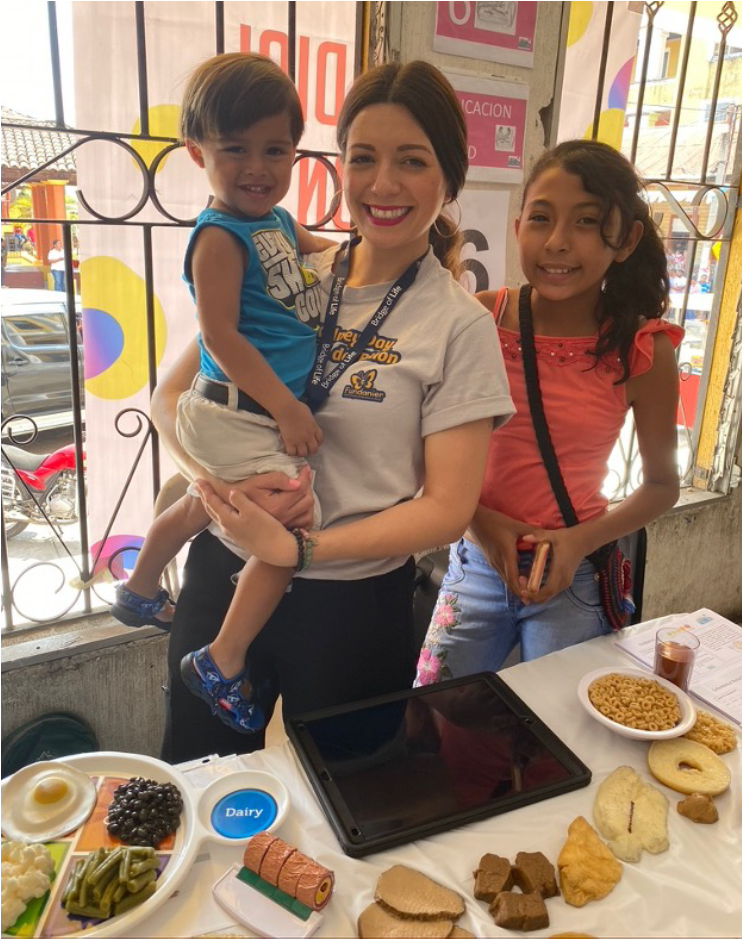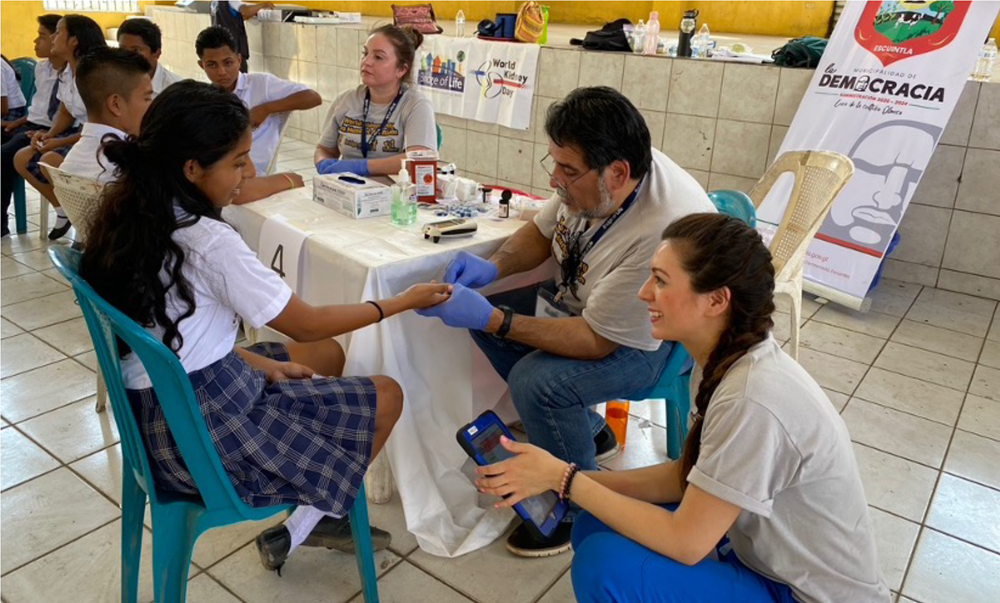Working Towards the Prevention of Global Chronic Kidney Disease: A Dietitian’s Journey Volunteering with Bridge of Life
Renal Nutrition Forum | May 5, 2025 | PDF
 In March 2020, eight healthcare volunteers embarked on
a medical mission in Guatemala. This group spent a week
providing health screens in rural communities, health and
nutrition education, and trained community health workers in
promoting the prevention of chronic diseases with an emphasis
on kidney health. The days were long, and the weather was hot,
but their experiences were enriching, and their hearts were full.
As this happened, the United States started reporting its first
cases of Covid-19. The week was ending, and Guatemala had
announced they were going to close their borders. The pandemic
was unfolding quickly. They were on the last few flights leaving
Guatemala and successfully returned home. However, back
home was not the same – grocery stores were empty, and ‘shelter
in place’ was being enforced. Suddenly they found themselves
joining the fight against Covid-19. I was one of these eight
healthcare professionals, and this was the start of my journey in
volunteering with Bridge of Life (BOL).
In March 2020, eight healthcare volunteers embarked on
a medical mission in Guatemala. This group spent a week
providing health screens in rural communities, health and
nutrition education, and trained community health workers in
promoting the prevention of chronic diseases with an emphasis
on kidney health. The days were long, and the weather was hot,
but their experiences were enriching, and their hearts were full.
As this happened, the United States started reporting its first
cases of Covid-19. The week was ending, and Guatemala had
announced they were going to close their borders. The pandemic
was unfolding quickly. They were on the last few flights leaving
Guatemala and successfully returned home. However, back
home was not the same – grocery stores were empty, and ‘shelter
in place’ was being enforced. Suddenly they found themselves
joining the fight against Covid-19. I was one of these eight
healthcare professionals, and this was the start of my journey in
volunteering with Bridge of Life (BOL).

Background on Bridge of Life
BOL is a non-profit organization founded by DaVita® that
provides humanitarian kidney care in underserved communities
in 15 countries. Their mission is to “strengthen healthcare
globally through sustainable programs that prevent and treat
chronic disease” (1). The BOL team works closely with their
global partners supporting their programs and providing
them with medical supplies, medications, sometimes dialysis
machines, and much more. During the pandemic, medical
missions were put on hold, but BOL continued to support their
partners by providing them with virtual training and personal
protective equipment (PPE). They recently resumed medical
missions and have been helping build peritoneal dialysis (PD)
rooms in Guatemala to help children living in remote areas.
Global Concern for CKD
Chronic kidney disease (CKD) is a global health concern
with an estimated 11-13% prevalence worldwide (2). Almost
700 million persons have CKD, and 1.2 million died from
CKD-related disorders in 2017 (2). The prevalence of CKD
is expected to increase with an increasing prevalence of
hypertension, obesity, and type 2 diabetes mellitus (3,4). The
rise of CKD leads to an economic burden and strains the
healthcare system, which has already experienced greater
demands due to the pandemic. However, recent findings from
a cross-sectional survey conducted by the International Society
of Nephrology suggested that CKD remains underprioritized
globally relative to its current and projected burden on
individuals and health systems (5).
Volunteering on Medical Missions as a Dietitian Guatemala
This medical mission was life-altering, not just because
of the timing going into the pandemic but because of my
experiences that later influenced the course of my career and
my involvement with BOL. My conversations with children,
parents, community members, and healthcare workers were
insightful to the health disparities many Guatemalans face.
One of these disparities is access to dialysis for the uninsured.
Employer-based health insurance is only available to 18% of
the Guatemalan population, and about 8% of the population has
access to private insurance (6). Only two institutions provide
dialysis without charge, one for adults and the other for children.
For adults, the demand for hemodialysis (HD) greatly exceeds
the current capacity, and patients who are scheduled for HD
have regularly been turned away due to resource shortages (6).
These patients receive HD every 7-10 days rather than three
times per week (6). The institution that serves children is called
Fundanier, and this is where we started our first day on the
medical mission.
Fundanier is the pediatric nephrology unit at the Roosevelt Hospital in Guatemala City and one of BOL’s partners. They provide free dialysis to all children with kidney disease, especially those with limited resources. Some of these children travel 5-8 hours on a bus one way to receive HD three days per week. The children were kind, happy, loving, and allaround inspiring. We enjoyed working with the fantastic team at Fundanier, comprised of a multidisciplinary team, including dietitians. In collaboration with their team, we went out to rural areas and provided health screens at several different school sites. We screened for hypertension, diabetes, and kidney disease. There were different stations that people would rotate through, and my role was to provide health and nutrition education. Before this trip, I created PowerPoint presentations to use on my iPad that were culturally sensitive to Guatemalan food and culture. I found this method of education effective as my slides served as a visual aid with lots of pictures.
When completing health screens at the Plaza of La Democracia, I received consults from volunteer physicians for nutrition education on hypertension, diabetes, kidney disease, obesity, and malnutrition. Many people I spoke with did not know they had kidney disease, some knew they had diabetes but could not afford their medications or glucometers to check their glucose levels. There was the one patient who was referred to me due to experiencing significant weight loss over the last six months. My initial thoughts were to recommend starting Incaparina, a popular protein drink in Guatemala that is affordable, and increasing intake of high-calorie foods. This was far from a feasible intervention. This man reported difficulty finding a job and with limited resources, he used the little money he had to feed his three children and wife. His wife’s family had taken them in; however, they became abusive to their children, and he decided it was better for them to be homeless than to live in an environment that was life-threatening for his children. He was renting a piece of land with nothing on it but dirt for 100 quetzals a month (equivalent to $13-14 US dollars); he used pieces of metal that he could find or what was donated to him to build shelter.
Unfortunately, I do not have the means or resources to help to the magnitude I wish I could, but what I can do is continue to volunteer my skill set. This is one of the reasons I am passionate and committed to volunteering with BOL. Additionally, it was working with children in Guatemala that motivated me to transition into pediatrics. Two years after this trip, I started working as a pediatric clinical dietitian and could not be happier with this decision.
Jamaica
CKD is one of Jamaica’s top 5 leading causes of death (7,8).
The prevalence of CKD was estimated as 86.3% among patients
at the diabetes clinic at the University Hospital of the West
Indies (UWHI) (9) . During the pandemic, BOL developed
a unique virtual education program to increase CKD health
awareness for their partners in Jamaica. The program is called
“Healthy Living with CKD” and consists of modules developed
by a team of volunteers, including myself. The curriculum
includes education on kidney disease, managing high blood
pressure, diabetes, diet and nutrition, hydration, understanding
lab results, medications, goal setting, finding support, and
preparing for treatment (when applicable). Patients are referred
to the Healthy Living with CKD program from the nephrology
clinic at UWHI. It is free of charge and accessible in person at
the hospital or remotely online.
As the pandemic settled, BOL was ready to return to the field. I joined their team on the medical mission in Jamaica which was filled with breathtaking scenery and incredible people. Meeting the team from the nephrology department at UWHI felt special as we had been working together during the pandemic and finally got to meet each other in person. Alongside the UWHI team, we screened more than 400 people in rural communities in 4 days. In addition to health screens, BOL provided medications for people with diabetes, hypertension, anemia, infections, and more. My friend and colleague, Meredith Larsen, and I worked at the health and nutrition education station. She provided nutrition counseling for people with increased risk for CKD or newly diagnosed with CKD. I provided presentations to small groups on healthy habits for better health. Conditions were interesting at times. I was told that at one point when I was presenting, a rat fell from the ceiling behind me. Also, I had to go to the emergency room for a tetanus shot after accidentally cutting myself on a rusty old nail. Getting the appropriate vaccinations before trips like this is essential – lesson learned.
We had a great time getting to know people, hearing their stories, and learning from each other. A musician who had been there for a health screening invited us to a memorable performance that evening. We went to see him play the steelpan, and it was magical. I was touched by the gratitude and kindness we received. Many Jamaicans treated us like family. The culture was laid back, joyful, and caring. I previously heard the saying “one love” but never knew what it meant, so I asked a Jamaican what this meant. They told me it means peace, love, and unity. I could not think of a better way to describe my experience in Jamaica.
Final Thoughts
 It is easy to get lost in the hustle of life and forget to appreciate
simple things like sleeping on a bed, access to clean water, or
even receiving a band-aid after an injection. My experiences
volunteering with BOL remind me not to take these simple
things for granted. My experiences have also reminded me of the
importance of compassion, humility, and resilience. Working with
children at Fundanier was profoundly touching and inspiring.
I often think about these children and hope they are healthy
and thriving. Jamaican culture also left a mark on my heart by
teaching me to slow down and practice “one love.” I am forever
grateful for these incredible experiences and look forward to
continuing my journey as a dietitian volunteer with BOL.
It is easy to get lost in the hustle of life and forget to appreciate
simple things like sleeping on a bed, access to clean water, or
even receiving a band-aid after an injection. My experiences
volunteering with BOL remind me not to take these simple
things for granted. My experiences have also reminded me of the
importance of compassion, humility, and resilience. Working with
children at Fundanier was profoundly touching and inspiring.
I often think about these children and hope they are healthy
and thriving. Jamaican culture also left a mark on my heart by
teaching me to slow down and practice “one love.” I am forever
grateful for these incredible experiences and look forward to
continuing my journey as a dietitian volunteer with BOL.
Read the original article in Renal Nutrition Forum.